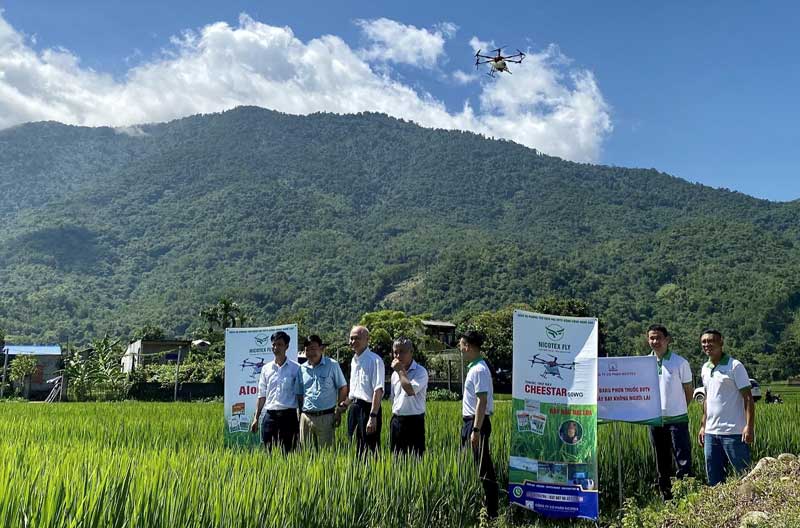
(HBO) - Hoa Binh province has set a goal of having revenue from the digital economy making up about 20 percent of its GRDP by 2025 and over 30 percent by 2030, in its efforts to grow amid the 4th Industrial Revolution.

Automatic irrigation machines and insecticide-spraying drones.
Also by 2025, the province targets to build broadband
internet infrastructure in communes, wards, and towns, basically complete
digital transition at public agencies, and get the local smart city planning
done. By 2030, it aims at ensuring 5G network coverage for locals to enjoy
high-speed internet at a low cost.
To actively join the revolution, Hoa Binh prioritises breakthroughs
in IT application, digital infrastructure development, and the building of
smart agriculture, tourism and urban areas, among others.
The local infrastructure basically meets requirements for
management and IT application, with all public agencies having internal
networks and connected to broadband internet services.
The provincial portal for administrative services,
established in July 2019, has so far received 4,629 documents. The local centre
for smart urban area management, meanwhile, was put into operation in September
this year. The Hoa Binh People’s Committee will complete the building
of its paperless meeting room system in October.
The province has also recorded increasing numbers of
businesses and services based on digital platforms, creating more opportunities
for locals to seek high-income jobs.
Regarding agriculture, technologies have been applied in
production, preservation, and distribution, with many localities, individuals,
and units operating a series of smart equipment such as automatic irrigation
machines and insecticide-spraying drones. The province has encouraged its
residents to engage in the One Commune One Product programme, register for
trademark protection of their farm produce, and expand production following the
VietGap standards.
In the medical sector, 100 percent of local hospitals have
installed applications for data management that link with the national
healthcare data system. Meanwhile, the education sector has included the
teaching of science, technology, engineering, and mathematics (STEM) in its new
curriculum for high school students. The transport sector has put into operation an AI platform
to handle traffic violations.
Hoa Binh has also worked with the Vietnam Posts and
Telecommunications Group (VNPT) to build a host of projects on smart tourism./.
The Standing Board of the Hoa Binh provincial Party Committee has agreed in principle on a proposal by the Standing Board of the Party Committee of Hoa Binh city to gather feedback on the city’s 1:2000 zoning plan, which forms part of its broader urban development strategy.
Hoa Binh province has made notable progress in public administration reform and digital government development, with the satisfaction index among citizens and businesses reaching over 84%, according to recent government evaluations.
Thanks to great efforts by local authorities in recent times, the governance and public administration performance of Mai Chau district has been significantly improved.
In the afternoon of June 6, the Party Committee, the People's Council, the People's Committee and the Fatherland Front of Lac Son district solemnly held a meeting to celebrate the 139th anniversary of the district's founding (1886–2025) and the 79th anniversary of the establishment of the district's Party Committee (1946–2025). There was the attendance of Mr. Bui Van Thang, the Vice Chairman of the Provincial People's Council; Mr. Quach Tat Liem, the Vice Chairman of the Provincial People's Committee; Ms. Dang Bich Ngoc, the Deputy Head of the National Assembly Delegation of the province; as well as the former leaders of the province and district through various periods, who are the natives of the district.
Implementing the Politburo’s Resolution No. 57-NQ/TW on breakthroughs in science – technology, innovation, and digital transformation is a golden opportunity for the northern mountainous province of Hoa Binh to renew growth model, improve competitive edge and shorten digital gap.
Resolution 57-NQ/TW, issued by the Politburo on December 22, 2024, identifies sci-tech, innovation, and digital transformation as strategic breakthroughs to build a developed and prosperous nation. In Hoa Binh province, this spirit is not just a slogan, it’s being put into action through concrete initiatives that form a "new development triangle”: digital citizenship, digital economy, and digital administration.



